|
|
| |
|
 Musings from the Edge of Forever
Musings from the Edge of Forever
Note: This blog expresses only the opinions of the blog owner,
and does not represent the opinion of any organization or blog
that is associated with RONIN ON EMPTY.
|
|
February 13th, 2011
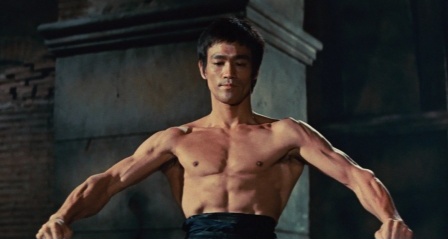
”To be the Man, you gotta beat the Man! Wooo!”
Conventional wisdom would suggest that when comparing martial artists, Bruce Lee stands supreme as the intense, indestructible killing machine, whereas Jackie Chan is the reverse: a happy-go-lucky everyman who just happens to know kung fu. But Bruce Lee’s performance in 1972’s Way of the Dragon runs counter to that assumption. Oh sure, Bruce kicks the living bejeezus out of everyone who gets in his way, but to be honest, his character is only a step away from the prototypical Jackie Chan character. Just like Jackie was in Rumble in the Bronx, Rush Hour, and Shanghai Noon, our man Bruce is the proverbial fish out of water in Way of the Dragon.
I took in a viewing of the Cantonese language version last night, and although I’m less enamored with the somewhat amateurish “comedy” bits that open the film, I’m still quite fond of the film. Bruce Lee remains a magnetic presence, and his confrontation with Chuck Norris at the Colosseum is definitely worth a look. For my full thoughts on the film, check out my review here. As with the previous Bruce Lee retro reviews, you can enjoy a vintage trailer embedded under the break.
Read the rest of this entry »
Posted in Ric Flair, Retro Review, Hong Kong cinema, Bruce Lee | No Comments »
February 12th, 2011
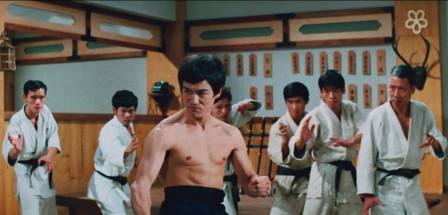
“Never tell me the odds!”
Though The Big Boss was a huge success for Bruce Lee in 1971, it was the 1972 follow-up Fist of Fury that truly catapulted him to the level of superstar - and with good reason. Once known in the United States as The Chinese Connection, this Lo Wei-directed flick may seem like just another “You killed my master!” revenge yarn, but Bruce Lee’s charismatic performance puts Fist of Fury at the very top of the heap. Spawning unofficial sequels, remakes, and numerous tributes, Fist of Fury rivals Enter the Dragon as Bruce Lee’s most known and most beloved film, particularly among Chinese audiences.
Read the rest of this entry »
Posted in Retro Review, Hong Kong cinema, Bruce Lee | No Comments »
February 11th, 2011
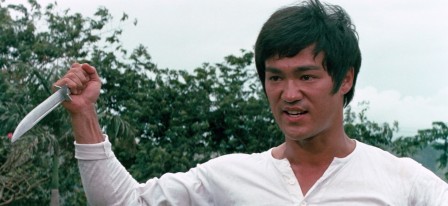
Bruce Lee auditions for the role of Norman Bates
Riding high on the overseas success of the canceled Green Hornet television series (re-titled “The Kato Show” in Hong Kong), Bruce Lee was finally given his big Hong Kong Cinema break by Golden Harvest head honcho Raymond Chow. After outbidding the Shaw Brothers for the actor’s services, the famous producer cast the promising young Lee in the 1971 production, The Big Boss. No one, including Bruce Lee himself, could have predicted the film’s massive success.
Known to most American fans as Fists of Fury, this Lo Wei-directed film centers on a young, “fresh off the boat” brawler named Cheng Chow-An (Bruce Lee), who has just moved to Thailand. For Cheng, the change of scenery from Guandong seems to have less to do with bonding with his expatriate cousins, and more to do with staying out of trouble. We learn early in the film that Cheng has promised his aging mother that his fighting days are through. He even has a good-luck pendant he wears around his neck to remind him of his solemn oath. But when he and his buddies run afoul of some nefarious drug-running gangsters, will Cheng Chow-An be able to keep his promise?
For a more in-depth look at the film, read my LoveHKFilm.com review. For visual learners, check out this kooky original U.S. trailer or watch the entire film (dubbed in English) under the cut.
Read the rest of this entry »
Posted in Retro Review, Hong Kong cinema, Bruce Lee | No Comments »
February 10th, 2011
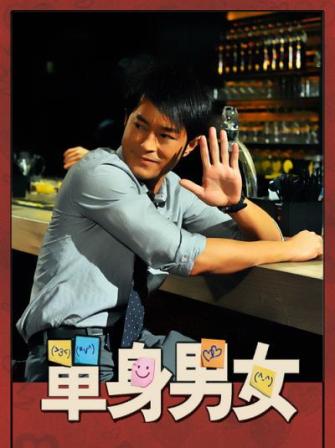 Today, news outlets like The Hollywood Reporter, NPR, and ABC News are carrying an Associated Press story that discusses Johnnie To’s many upcoming film projects. According to journalist Min Jin’s article, To has made a calculated decision to shoot light romances geared specifically toward the China market rather than make the kind of films he’s become more famous for — those slick urban crime thrillers that have earned him not just critical praise, but a cult following of fanboys and girls internationally. Today, news outlets like The Hollywood Reporter, NPR, and ABC News are carrying an Associated Press story that discusses Johnnie To’s many upcoming film projects. According to journalist Min Jin’s article, To has made a calculated decision to shoot light romances geared specifically toward the China market rather than make the kind of films he’s become more famous for — those slick urban crime thrillers that have earned him not just critical praise, but a cult following of fanboys and girls internationally.
In addition to 2011’s Don’t Go Breaking My Heart, To is currently working on High Altitude Romance II, a film which stars Louis Koo, Sammi Cheng, Huang Yi, Gao Yuanyuan, and Wang Baoqiang. Although the title is alleged to be a direct translation of the Chinese title, that doesn’t really explain what happened to the seemingly non-existent High Altitude Romance I.
In any event, the bigger news (at least to me) was the revelation that To will be reuniting his Needing You/Love on a Diet/Yesterday Once More co-stars Andy Lau and Sammi Cheng for a comedy geared for Mainland Chinese audiences. Rounding out To’s projects is a brief mention of a third film in the Milky Way Image pipeline, a project tentatively titled Lethal Gold, which is set to star Lau Ching-Wan and Richie Ren — that is, if certain scheduling issues can be resolved.
However, central concern of this AP article isn’t so much the number of projects, but To’s reasoning for doing two, possibly three romantic comedies in a row. In a totally pragmatic, but no less depressing statement, To explains the change:
“This is intentional. We need to cultivate that market. It’s difficult to do that with the kind of movies we typically make. In order to avoid problems and excessive edits with the censors, we are making softer movies like love stories and comedies,” To told reporters. “If we make a crime movie or one of our more personal films, there will be more obstacles.”
Unlike some Hong Kong cinema fans, I don’t necessarily need The Mission Part VII from Johnnie To and Wai Ka-Fei, but it’s sad to see that serious concerns over censorship are preventing him from making more personal films. I sincerely hope that this strategic attempt to a) avoid getting their films cut to shreds by censors and b) make some dough back for their investors doesn’t result in largely impersonal, soulless crap.
I guess we’ll get our first glimpse on March 31st when Don’t Go Breaking My Heart is released to theaters. The film stars Louis Koo, Daniel Wu, Gao Yuanyuan, Lam Suet, and J.J. Jia. If you’d like to see a trailer for the film or perhaps read Media Asia’s unnecessarily excessive and spoiler-filled plot synopsis, click on the link below.
Read the rest of this entry »
Posted in 2011 Preview, Louis Koo, Johnnie To, Daniel Wu, Hong Kong cinema | 2 Comments »
February 9th, 2011
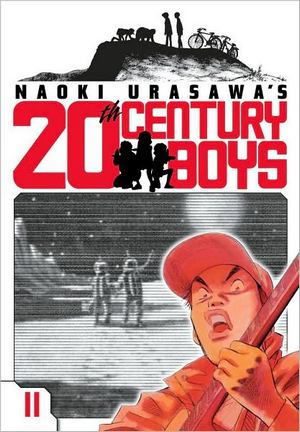
Rating: “T+ for Older Teen”
Story & Art: Naoki Urasawa
Publisher: Viz Media
Review:
In the previous volume of 20th Century Boys, readers were left to grapple with the huge bombshell that Friend, the evil mastermind pulling the strings of a vast conspiracy, may actually be the father of Kanna Endo, our plucky female protagonist. Holy Vader at Bespin, Batman!
On a more positive note, Kanna also discovers crucial information about her missing mother, Kiriko Endo, who disappeared when she was just a little girl. If Kanna thought learning her father’s identity was bad, wait’ll she finds out her mom is Godzilla! Okay, it’s a metaphor, but still…
Meanwhile, teen Koizumi Kyoko has tracked down Sadakiyo, the creepy kid-turned-creepier teacher who, for the longest time, was the most likely suspect in the search to uncover Friend’s true identity. Although deeply entangled in the Friend’s cult of personality, Sadakiyo actually wants to help Koizumi, although he may not get the chance. It seems the evil cult leader’s relentless henchmen are hot on their heels — with orders to kill!
And it wouldn’t be 20th Century Boys without a flashback, now would it? In addition to detailing the events of present day 2014, the manga gives us a flashback to a time in 2002 when Mon-Chan, a character who featured heavily in the initial volumes of the series, actually found Sadakiyo and got him to spill his guts about Friend — in writing, no less! But what happened to that supposedly earth-shattering memo about Friend’s true identity anyway?
Read the rest of this entry »
Posted in 20th Century Boys, LOST | No Comments »
February 8th, 2011
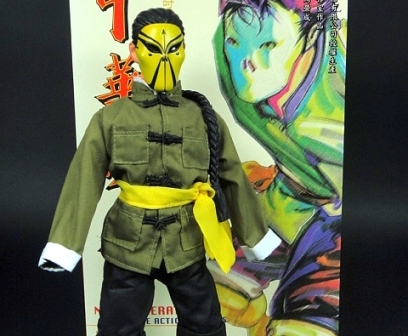
Photo courtesy of Limited Edition Toys
As promised, here is the second figure in Dragon Models’ A Man Called Hero collection, Phantom Servant. Also known by such names as Ghost Servant, Ghost Server (sounds like a scary waiter), and Shadow (played by Dion Lam and voiced by Jordan Chan) in the 1999 Andrew Lau film, the character serves (get it?) as a trusted ally of the comic book’s main protagonist, Hero Hua Ying-Hung. Setting him apart from the pack is Phantom Servant’s curious appearance, as he is distinguished by a) his complete lack of arms and b) a horribly disfigured Phantom of the Opera-style mug. Sadly, I don’t own this figure, but you can check out pictures of this curious 12-inch figure just under the cut.
Read the rest of this entry »
Posted in A Man Called Hero, Toys, Hong Kong cinema | No Comments »
February 7th, 2011
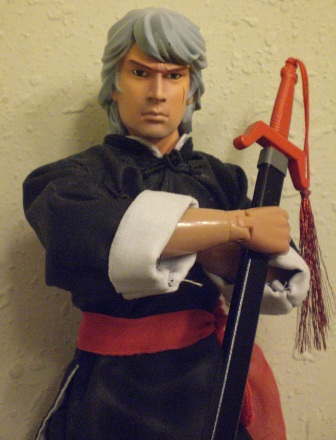
Can you tell I’m a fan of A Man Called Hero? While I know there’s a lot of new and interesting toys on the market, this regular column will also be dedicated to the various Hong Kong cinema-related action figures I own, and — for good or for ill — a large portion of those toys include characters featured in A Man Called Hero and Storm Riders.
From what I can gather, Dragon Models, Ltd. created this now decommissioned figure of Hero Hua Ying-Hung sometime around 1999, which you can find listed under the name of “A Man Called Hero,” “Chinese Hero,” and even “Oriental Hero.” I own the figure pictured on the right, which is based on Ma Wing-Shing’s popular comic book, but apparently there were at least three more versions of the figure created. One looks exactly like mine, except with a different hair color and costume (pictured below). The other two share a dramatically different head sculpt.
In conjunction with the 1999 movie A Man Called Hero, Dragon Models released two editions of the figure that bore the likeness of the film’s star, Ekin Cheng — an “old version” dressed in the same black wardrobe as the one I own and a “young” Ekin dressed in a brown-colored costume. From what I’ve seen, the box for both the comic and movie versions of Hero Hua appear practically identical. Too bad a scale version of the Statue of Liberty playset was unavailable for purchase.
Read the rest of this entry »
Posted in Ma Wing-Shing, A Man Called Hero, Toys, Ekin Cheng | No Comments »
|
|
|
| |
| |
|
|
|
|
|
|
|
|
|
|
|
|
|
|
|
|
|
|
|
|
|
|
|
|
|
|
|
|
|
|
|
|
|
|
|
|
|
|
|
|
|
|
|
|
|
|
|
|
|
|
|
| LoveHKFilm.com
Copyright © 2002-2025 Ross Chen |
|
|





 Today, news outlets like
Today, news outlets like 
